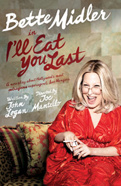I'll Eat You Last Playwright John Logan on Why Hollywood Will Never See Another Character Like Sue Mengers
About the author:
Tony winner and three-time Oscar nominee John Logan is back on Broadway with I’ll Eat You Last: A Chat with Sue Mengers, his first show since the 2010 award-winning drama Red. As in Red, Logan is bringing a historical figure back to vivid life, but this time the artist in question is one of Hollywood’s most unique figures: female superagent Sue Mengers (played by the incomparable Bette Midler). Below, the James Bond and Gladiator screenwriter explains the dinner party that sparked the stage comedy and why Hollywood will never see another one like Sue.
![]()
I’ll Eat You Last began with a memorable encounter, when I met Sue Mengers herself. It was at a dinner party in 2008. I was, by far, the least famous person at the table, so she didn’t have much time for me. But I was fascinated by her and persistent in my conversation volleys. Finally she deigned to glance over her tinted glasses and speak to me and I got a full-frontal assault of her famed superagent persona: the wicked wit; constant cigarettes; lacerating asides; flowing caftan and stevedore language. When she lit up a joint and a cigarette at the same time, I was hooked.
But what most intrigued me about Sue was a sense of sadness, a deep resignation; a powerful woman whose time had passed. Late in the evening I asked her what had changed most about Hollywood since she had arrived. She didn’t hesitate for a second: “Honey, we used to have fun.” That Sue Mengers, bemused, self-aware and poignant, stayed with me and was finally the reason I wrote the play.
The first person I spoke to about the play was Graydon Carter, the editor of Vanity Fair and now producer of I’ll Eat You Last. His immediate enthusiasm was exciting, and he graciously opened the door to a series of interviews I did with Sue’s clients, colleagues, friends and enemies. He made the introductions and I sallied forth with steno pad in hand—a lot more fun than researching Mark Rothko for Red, I can assure you.
The scores of interviews I did allowed Sue to emerge more fully and in much more complexity than I had first imagined. Some people gossiped, others laughed, many criticized, and a few cried. Almost to a person they said a version of this: Sue was unique, there will never be another one quite like her. Her brio and combative nerve are rare in Hollywood now, where marketing directors and financiers so often set the agenda.
In Sue’s day she would pick up the phone, light a cigarette, and begin to assault or seduce studio heads into doing exactly what she wanted. She was persistent and ferocious and alarming in equal measure. It was a Hollywood built on sociability, wit, cocaine and verbal dexterity. Those days are gone now. Maybe we’re better off, but I miss the wild morass that produced moves like Chinatown, The Godfather, Taxi Driver, Klute, Star Wars, Cabaret and Paper Moon.
But for a while at least, you can revisit those wicked old days at the Booth Theatre and meet the woman who so fascinated me, now played by the indomitable Bette Midler, a woman just as fiercely funny and incisive as Sue. I like to think Sue would be pleased with our work, sitting on a luxurious sofa up in heaven—or more likely down below—lighting a cigarette or a joint, or both, and smiling.
